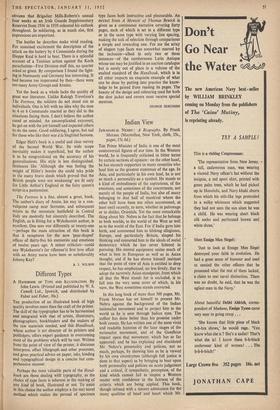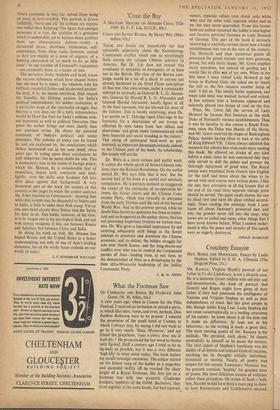Indian View
THE Prime Minister of India is one of the most controversial figures of our time. In the Western world, he is frequently criticised in bitter terms by certain sections of opinion : on the other hand, he has staunch supporteri in many countries who laud him as the greatest statesman of the age. In Asia, and particularly in his own land, he is not so much a personality as a symbol. He stands as a kind of embodiment of the aspirations, of the emotions, and sometimes of the resentments, not merely of the people of India, but also of many belonging to that half of mankind whom the other half have been too often accustomed, at least until recently, to term, whether in patronage or in dislike, Orientals. Yet the most remarkable thing about Mr. Nehru is the fact that he belongs to both worlds, to the world of the West as well as to the world of the East. For if India gave him birth, and summoned him to lifelong allegiance, Europe, and particularly Britain, shaped his thinking and converted him to the ideals of social democracy which he has never faltered in pursuing. His mental equipment unites much of what is best in European as well as in Asian thought; and if he has shown himself insistent that the point of view of Asia is entitled to deep respect, he has emphasised, no less firmly, that to adopt the narrowly Asian standpoint, from which all that the West stands for is excluded, is to fall into the very same error of which, in his view, the West sometimes stands convicted.
In this long book of more than 500 pages, Mr. Frank Moraes has set himself to present Mr. Nehru against the background of the Indian nationalist movement and to project him to the world as he is seen through Indian eyes. The author has done better than his promise under both counts. He has written one of the most vivid and readable histories of the later stages of the nationalist movement, and of the Gandhian impact upon that movement, which has so far appeared; and he has explained and elucidated Mr. Nehru's personality and policies, not so much, perhaps, by showing him as he is viewed by his own countrymen (although full justice is done to that aspect) as by bringing to bear upon both personality and policies an acute judgement and a critical, if sympathetic, perception, of the kind which cannot fail to inspire a Western reader with confidence in the fairness of the criteria which are being applied. This book, though infused with a sincere admiration for the many qualities of head and heart which Mr.
Nehru possesses, is very far indeed from being an essay in hero-worship. The portrait is drawn faithfully, 'warts and all.' Its outlines are impres- sive rather than flattering. The figure that emerges possesses, it is true, the qualities of a greatness which is undeniable; yet to balance these qualities
• there are characteristic defects—vanity, a dictatorial strain, aloofness, intolerance, self- centredness. Even these traits, however, rooted as they sire mainly in a sense of urgency, of a burning conviction of `so much to do, so little done'—to use another of Cromwell's expressions —are essentially those or a leader of men.
The narrative, lively, readable and lucid, traces the various influences which have shaped Nehru into the man he is today : his relations with his brilliant., masterful father and his devoted mother; his deep, if by no means uncritical, filial respect for Gandhi; his lifelong passion for India's political independence; his sudden realisation, at a particular stage of the nationalist struggle, that because a vote does not till a belly independence would be Dead Sea fruit for India's millions with- out economic as well as political liberation. One point the author brings out more clearly than any previous writer. He shows the essential continuity of Nehru's political and social principles. The • policies of today can be traced to, and are explained by, the conclusions which Nehru hammered out in his own mind, often years ago. In acting upon these conclusions he mdlr temporise; but he never shifts his aim. This is particularly true in the realm of foreign policy, which Mr. Moraes, by a considerable feat of exposition, makes both consistent and intel- ligible: even the shifts over Kashmir fall into their place against that background. A very important part of the book for readers in this country is the pages in which the author analyses the Asian reaction to Communism : showing that while that system may be distasteful to Nehru and to India, it fails to.make their flesh creep. Yet no one sees more clearly than Nehru that the 'battle for Asia' is on. This battle, however, in his view, is to be fought out in the ideological field, and not with atomic weapons. It lies: not between Russia and America, but between China and India.
By doing his work so well, Mr. Moraes has helped Britain and the United States to a better understanding, not only of one of Asia's leading statesmen, but of the whole Asian outlook on our world of today.
L. F. RUSHBROOK WILLIAMS



































 Previous page
Previous page